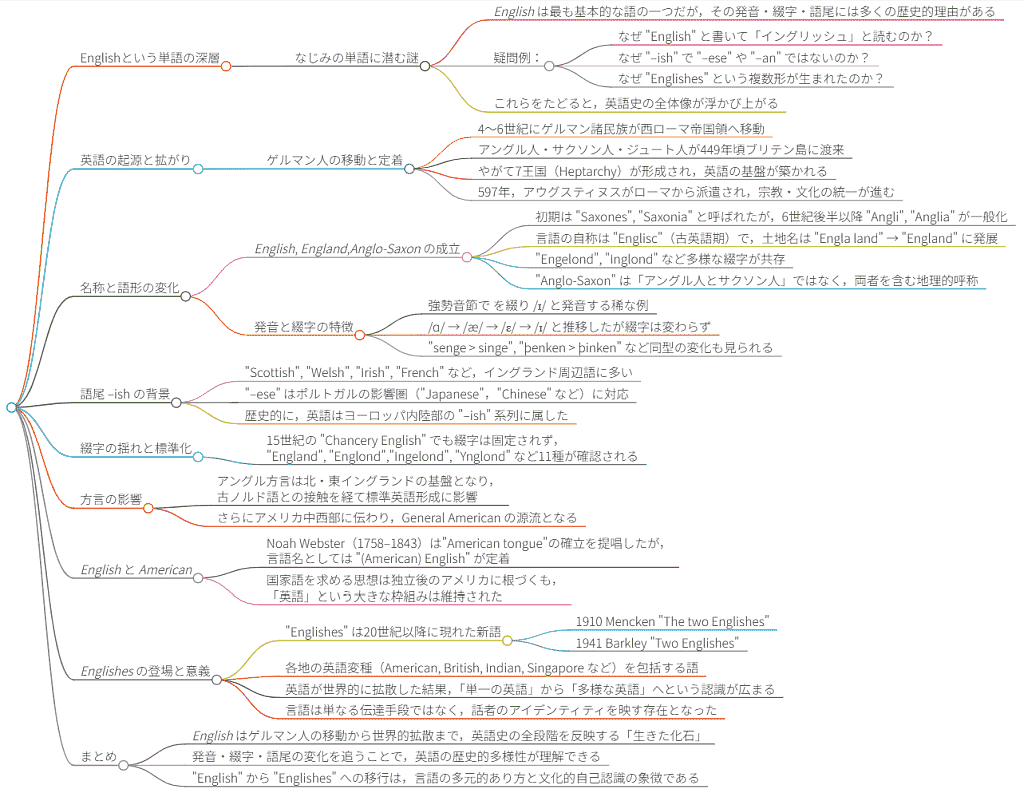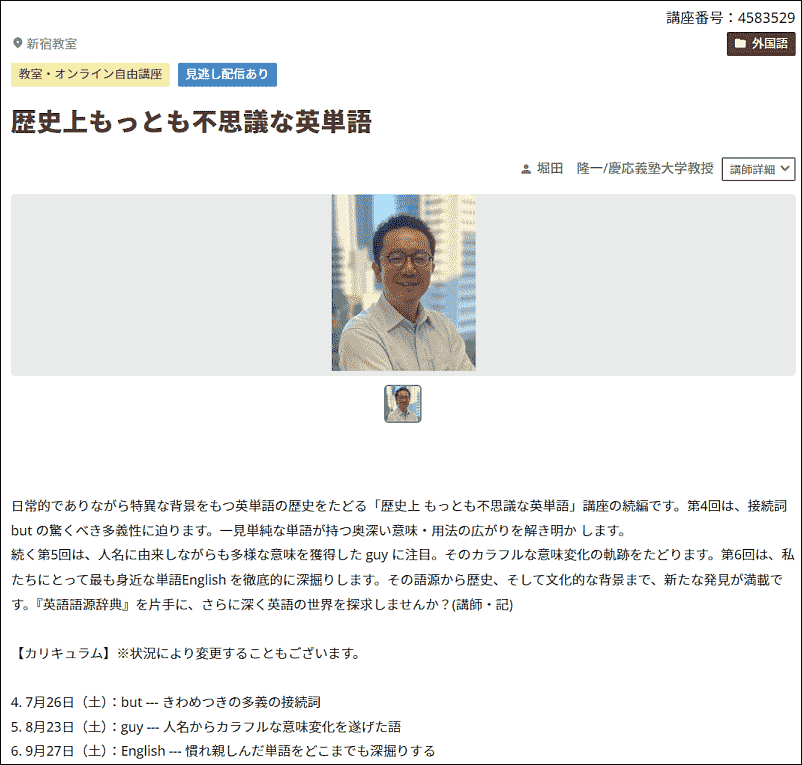2025-10-13 Mon
■ #6013. 2025年度の朝カルシリーズ講座の第6回「English --- 慣れ親しんだ単語をどこまでも深掘りする」をマインドマップ化してみました [asacul][mindmap][notice][kdee][hee][etymology][hel_education][link][sound_change][spelling_pronunciation_gap][anglo-saxon][jute][history][germanic][oe][world_englishes][demonym][suffix][onomastics]
9月27日(土)に,今年度の朝日カルチャーセンターのシリーズ講座「歴史上もっとも不思議な英単語」の第6回(夏期クールとしては第3回)が新宿教室にて開講されました.テーマは「English --- 慣れ親しんだ単語をどこまでも深掘りする」です.あまりに馴染み深い単語ですが,これだけで90分語ることができるほど豊かなトピックです.
講座と関連して,事前に Voicy heldio にて「#1574. "English" という英単語について思いをめぐらせたことはありますか? --- 9月27日の朝カル講座」を配信しました.
この第6回講座の内容を markmap によりマインドマップ化して整理しました(画像をクリックして拡大).復習用にご参照いただければ.

なお,この朝カル講座のシリーズの第1回から第4回についてもマインドマップを作成しています.
・ 「#5857. 2025年度の朝カルシリーズ講座の第1回「she --- 語源論争の絶えない代名詞」をマインドマップ化してみました」 ([2025-05-10-1])
・ 「#5887. 2025年度の朝カルシリーズ講座の第2回「through --- あまりに多様な綴字をもつ語」をマインドマップ化してみました」 ([2025-06-09-1])
・ 「#5915. 2025年度の朝カルシリーズ講座の第3回「autumn --- 類義語に揉み続けられてきた季節語」をマインドマップ化してみました」 ([2025-07-07-1])
・ 「#5949. 2025年度の朝カルシリーズ講座の第4回「but --- きわめつきの多義の接続詞」をマインドマップ化してみました」 ([2025-08-10-1])
・ 「#5977. 2025年度の朝カルシリーズ講座の第5回「guy --- 人名からカラフルな意味変化を遂げた語」をマインドマップ化してみました」 ([2025-09-07-1])
シリーズの次回,第7回は,10月25日(土)「I --- 1人称単数代名詞をめぐる物語」と題して開講されます.秋期クールの開始となるこの回より,開講時間は 15:30--17:00,開講方式はオンラインのみへ変更となります.ご関心のある方は,ぜひ朝日カルチャーセンター新宿教室の公式HPより詳細をご確認の上,お申し込みいただければ幸いです.
2025-09-18 Thu
■ #5988. 9月27日(土),朝カル講座の夏期クール第3回「English --- 慣れ親しんだ単語をどこまでも深掘りする」が開講されます [asacul][notice][demonym][suffix][onomastics][kdee][hee][etymology][hel_education][helkatsu]

毎月1回,朝日カルチャーセンター新宿教室での英語史講座を開いています.今年度のシリーズは「歴史上もっとも不思議な英単語」です.英語史的に厚みと含蓄のある英単語を1つ選び,そこから説き起こして,『英語語源辞典』(研究社)や『英語語源ハンドブック』(研究社)等の参考図書の記述を参照しながら,その英単語の歴史,ひいては英語全体の歴史を語ります.
来週末の9月23日(土)の講座は夏期クールの3回目となります.今回は英語を学ぶ誰もが最も多く発したり聞いたりし,さらに読み書きもしてきた重要単語 English に注目します.この当たり前すぎる英単語をめぐる歴史は,実は英語史のおもしろさを煮詰めたような物語になっています.ふと立ち止まって考えてみると,謎に満ちた単語なのです.
・ なぜ「アングレ」(フランス語)や「エングリッシュ」(ドイツ語)ではなく英語では「イングリッシュ」なの?
・ English と綴って「イングリッシュ」というのはおかしいのでは?
・ England や Anglia との関係は?
・ なぜ Japanese の -ese や American の -n ではなく English には -ish の語尾がつくの?
・ なぜ米語は American ではなく,あくまで (American) English と呼ばれるの?
・ 言語名は通常は固有名詞かつ単数として扱われるのに,なぜ最近 Englishes という複数形が使われているの?
民族,国,言語,文化,歴史に関わる重要単語なので,このように疑問が尽きないのです.講座では,他の民族を表わす単語などとも比較しながら,English に込められた謎に迫ります.
講座への参加方法は新宿教室での直接受講,オンライン参加のいずれかをお選びいただけます.さらに2週間の見逃し配信サービスもあります.皆さんのご都合のよい方法でご参加いただければ幸いです.申込みの詳細は朝カルの公式ページよりご確認ください.
なお,この講座の見どころについては heldio で「#1574. "English" という英単語について思いをめぐらせたことはありますか? --- 9月27日の朝カル講座」としてお話ししています.こちらもあわせてお聴きいただければ幸いです.
</p><p align="center"><iframe src=https://voicy.jp/embed/channel/1950/7099532 width="618" height="347" frameborder=0 scrolling=yes style=overflow:hidden></iframe></p><p>
・ 寺澤 芳雄(編集主幹) 『英語語源辞典』新装版 研究社,2024年.
・ 唐澤 一友・小塚 良孝・堀田 隆一(著),福田 一貴・小河 舜(校閲協力) 『英語語源ハンドブック』 研究社,2025年.
2024-10-01 Tue
■ #5636. 9月下旬,Mond で10件の疑問に回答しました [mond][sobokunagimon][hel_education][notice][link][helkatsu][adjective][slang][derivation][demonym][perfect][grammaticalisation][h][word_order][syntax][final_e][subjectification][intersubjectification][personal_pronoun][gender]

10月が始まりました.大学の新学期も開始しましたので,改めて「hel活」 (helkatsu) に精を出していきたいと思います.9月下旬には,知識共有サービス Mond にて10件の英語に関する質問に回答してきました.今回は,英語史に関する素朴な疑問 (sobokunagimon) にとどまらず進学相談なども寄せられました.新しいものから遡ってリンクを張り,回答の要約も付します.
(1) なぜ英語にはポジティブな形容詞は多いのにネガティヴな形容詞が少ないの?
回答:英語にはポジティヴな形容詞もネガティヴな形容詞も豊富にありますが,教育的配慮や社会的な要因により,一般的な英語学習ではポジティヴな形容詞に触れる機会が多くなる傾向がありそうです.実際の言語使用,特にスラングや口語表現では,ネガティヴな形容詞も数多く存在します.
(2) 地名と形容詞の関係について,Germany → German のように語尾を削る物がありますが?
回答:国名,民族名,言語名などの関係は複雑で,どちらが基体でどちらが派生語かは場合によって異なります.歴史的な変化や自称・他称の違いなども影響し,一般的な傾向を指摘するのは困難です.
(3) 現在完了の I have been to に対応する現在形 *I am to がないのはなぜ?
回答:have been to は18世紀に登場した比較的新しい表現で,対応する現在形は元々存在しませんでした.be 動詞の状態性と前置詞 to の動作性の不一致も理由の一つです.「現在完了」自体は文法化を通じて発展してきました.
(4) 読まない語頭以外の h についての研究史は?
回答:語中・語末の h の歴史的変遷,2重字の第2要素としてのhの役割,<wh> に対応する方言の発音,現代英語における /h/ の分布拡大など,様々な観点から研究が進められています.h の不安定さが英語の発音や綴字の発展に寄与してきた点に注目です.
(5) 言語による情報配置順序の特徴と変化について
回答:言語によって言語要素の配置順序に特有の傾向があり,これは語順,形態構造,音韻構造など様々な側面に現われます.ただし,これらの特徴は絶対的なものではなく,歴史的に変化することもあります.例えば英語やゲルマン語の基本語順は SOV から SVO へと長い時間をかけて変化してきました.
(6) なぜ come や some には "magic e" のルールが適用されないの?
回答:come,some などの単語は,"magic e" のルールとは無関係の歴史を歩んできました.これらの単語の綴字は,縦棒を減らして読みやすくするための便法から生まれたものです.英語の綴字には多数のルールが存在し,"magic e" はそのうちの1つに過ぎません.
(7) Let's にみられる us → s の省略の類例はある? また,意味が変化した理由は?
回答:us の省略形としての -'s の類例としては,shall's (shall us の約まったもの)がありました.let's は形式的には us の弱化から生まれましたが,機能的には「許可の依頼」から「勧誘」へと発展し,さらに「なだめて促す」機能を獲得しました.これは言語の主観化,間主観化の例といえます.
(8) 英語にも日本語の「拙~」のような1人称をぼかす表現はある?
回答:英語にも謙譲表現はありますが,日本語ほど体系的ではありません.例えば in my humble opinion や my modest prediction などの表現,その他の許可を求める表現,著者を指示する the present author などの表現があります.しかし,これらは特定の語句や慣用表現にとどまり,日本語のような体系的な待遇表現システムは存在しません.
(9) 英語史研究者を目指す大学4年生からの相談
回答:大学卒業後に社会経験を積んでから大学院に進学するキャリアパスは珍しくありません.教育現場での経験は研究にユニークな視点をもたらす可能性があります.研究者になれるかどうかの不安は多くの人が抱くものですが,最も重要なのは持続する関心と探究心,すなわち情熱です.研究会やセミナーへの参加を続け,学びのモチベーションを保ってください.
(10) 英語の人称代名詞における性別区分の理由と新しい代名詞の可能性は?
回答:1人称・2人称代名詞は会話の現場で性別が判断できるため共性的ですが,3人称単数代名詞は会話の現場にいない人を指すため,明示的に性別情報が付されていると便利です.現代では性の多様性への認識から,新しい共性の3人称単数代名詞が提案されていますが,広く受け入れられているのは singular they です.今後も要注目の話題です.
以上です.10月も Mond より,英語(史)に関する素朴な疑問をお寄せください.
2024-01-07 Sun
■ #5368. ethnonym (民族名) [demonym][onomastics][toponymy][personal_name][name_project][ethnonym][terminology][toc][ethnic_group][race][religion][geography]
民族名,国名,言語名はお互いに関連が深い,これらの(固有)名詞は名前学 (onomastics) では demonym や ethnonym と呼ばれているが,目下少しずつ読み続けている名前学のハンドブックでは後者の呼称が用いられている.
ハンドブックの第17章,Koopman による "Ethnonyms" の冒頭では,この用語の定義の難しさが吐露される.何をもって "ethnic group" (民族)とするかは文化人類学上の大問題であり,それが当然ながら ethnonym という用語にも飛び火するからだ.その難しさは認識しつつグイグイ読み進めていくと,どんどん解説と議論がおもしろくなっていく.節以下のレベルの見出しを挙げていけば次のようになる.
17.1 Introduction
17.2 Ethnonyms and Race
17.3 Ethnonyms, Nationality, and Geographical Area
17.4 Ethnonyms and Language
17.5 Ethnonyms and Religion
17.6 Ethnonyms, Clans, and Surnames
17.7 Variations of Ethnonyms
17.7.1 Morphological Variations
17.7.2 Endonymic and Exonymic Forms of Ethnonyms
17.8 Alternative Ethnonyms
17.9 Derogatory Ethnonyms
17.10 'Non-Ethnonyms' and 'Ethnonymic Gaps'
17.11 Summary and Conclusion
最後の "Summary and Conclusion" を引用し,この分野の魅力を垣間見ておこう.
In this chapter I have tried to show that while 'ethnonym' is a commonly used term among onomastic scholars, not all regard ethnonyms as proper names. This anomalous status is linked to uncertainties about defining the entity which is named with an ethnonym, with (for example) terms like 'race' and 'ethnic group' being at times synonymous, and at other times part of each other's set of defining elements. Together with 'race' and 'ethnicity', other defining elements have included language, nationality, religion, geographical area, and culture. The links between ethnonyms and some of these elements, such as religion, are both complex and debatable; while other links, such as between ethnonyms and language, and ethnonyms and nationality, produce intriguing onomastic dynamics. Ethnonyms display the same kind of variations and alternatives as can be found for personal names and place-names: morpho-syntactic variations, endonymic and exonymic forms, and alternative names for the same ethnic entity, generally regarded as falling into the general spectrum of nicknames. Examples have been given of the interface between ethnonyms, personal names, toponyms, and glossonyms.
In conclusion, although ethnonyms have an anomalous status among onomastic scholars, they display the same kinds of linguistic, social, and cultural characteristics as proper names generally.
「民族」周辺の用語と定義の難しさについては以下の記事も参照.
・ 「#1871. 言語と人種」 ([2014-06-11-1])
・ 「#3599. 言語と人種 (2)」 ([2019-03-05-1])
・ 「#3706. 民族と人種」 ([2019-06-20-1])
・ 「#3810. 社会的な構築物としての「人種」」 ([2019-10-02-1])
また,ethnonym のおもしろさについては,関連記事「#5118. Japan-ese の語尾を深掘りする by khelf 新会長」 ([2023-05-02-1]) も参照されたい.
・ Koopman, Adrian. "Ethnonyms." Chapter 17 of The Oxford Handbook of Names and Naming. Ed. Carole Hough. Oxford: OUP, 2016. 251--62.
2023-07-10 Mon
■ #5187. 固有名詞学のハンドブック [review][onomastics][personal_name][toponymy][eponym][demonym][toc]
本ブログでは,「名前」を扱う言語学の分野,固有名詞学 (onomastics) に関する話題を多く取り上げてきた.人間の社会生活において名前が関わらない領域はほとんどないといってよく,名前の言語学は必然的に学際的なものとなる.実際,この分野には,昨今,熱い視線が注がれている.今回紹介するのは,この限りなく広い分野をエキサイティングに導入してくれるハンドブックである.

私はまだ Hought によるイントロを読んだにすぎないが,すでにこの分野のカバーする領域の広さに圧倒されている.以下に目次を示そう.
Front Matter
1. Introduction
Part I. Onomastic Theory
2. Names and Grammar
3. Names and Meaning
4. Names and Discourse
Part II. Toponomastics
5. Methodologies in Place-name Research
6. Settlement Names
7. River Names
8. Hill and Mountain Names
9. Island Names
10. Rural Names
11. Street Names: A Changing Urban Landscape
12. Transferred Names and Analogy in Name-formation
Part III. Anthroponomastics
13. Personal Naming Systems
14. Given Names in European Naming Systems
15. Family Names
16. Bynames and Nicknames
17. Ethnonyms
18. Personal Names and Anthropology
19. Personal Names and Genealogy
Part IV. Literary Onomastics
20. Theoretical Foundations of Literary Onomastics
21. Names in Songs: A Comparative Analysis of Billy Joel's We Didn't Start The Fire and Christopher Torr's Hot Gates
22. Genre-based Approaches to Names in Literature
23. Corpus-based Approaches to Names in Literature
24. Language-based Approaches to Names in Literature
Part V. Socio-onomastics
25. Names in Society
26. Names and Identity
27. Linguistic Landscapes
28. Toponymic Attachment
29. Forms of Address
30. Pseudonyms
31. Commercial Names
Part VI. Onomastics and Other Disciplines
32. Names and Archaeology
33. Names and Cognitive Psychology
34. Names and Dialectology
35. Names and Geography
36. Names and History
37. Names and Historical Linguistics
38. Names and Language Contact
39. Names and Law
40. Names and Lexicography
41. Place-names and Religion: A Study of Early Christian Ireland
Part VII. Other Types of Names
42. Aircraft Names
43. Animal Names
44. Astronomical Names
45. Names of Dwellings
46. Railway Locomotive Names and Train Names
47. Ship Names
End Matter
Bibliography
Index
800ページ超の大部ではあるが,それでも名前に関わる分野を網羅しているとは言えなさそうだ.それくらいに広い分野だということだ.固有名詞学,恐るべし.
・ Hough, Carole, ed. The Oxford Handbook of Names and Naming. Oxford: OUP, 2016.
2023-05-02 Tue
■ #5118. Japan-ese の語尾を深掘りする by khelf 新会長 [aokikun][voicy][heldio][khelf][colloquia][link][demonym][suffix][onomastics]
皆さん,なぜ Japan には -ese という語尾がつくのか,気になりますよね? *Japan-ian でもなく *Japan-ish でもなく,英語では Japan-ese ということになっています.
この問題に英語史あるいは英語歴史言語学の観点から踏み込んでみると,魅惑的かつ複雑なパズルが展開しています.khelf(慶應英語史フォーラム)の新会長の青木輝さんが,この問題に分け入っています.
今朝の Voicy 「英語の語源が身につくラジオ (heldio)」では,青木さんとの対談でこの対談を深掘りしています.「#701. なぜ「日本人」は Japan-ese なの?の深掘り回 --- 青木輝さんとの対談」をお聴きください.
この対談のベースとなっているのは,『コロキア』 (Colloquia) の論文として公表されている以下のものです.
・ Aoki, Hikaru. "Why Japan-ese and Not Japan-ian?: Historical Relations between Demonymic Suffixes and Country Names." Colloquia 43 (2022): 85--102.
この論文に基づいて,青木さんは khelf 活動を通じて,たびたび研究成果を公開してきています.
・ 『英語史新聞』第5号の第1面の記事「人々の名称の謎を追う --- なぜ X-ish という呼び名はイギリス周辺に多いのか --- なぜ X-ish という呼び名はイギリス周辺に多いのか ---」
・ heldio 「#680. なぜ「日本人」は Japanian などではなく Japanese なの? --- 青木輝さんとの対談
・ heldio 「#683. なぜ English のように -ish のつく呼び名はイギリス周辺に多いの? --- 青木輝さんとの対談」
Powered by WinChalow1.0rc4 based on chalow